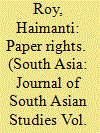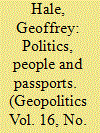| Srl | Item |
| 1 |
ID:
145457


|
|
|
|
|
| Summary/Abstract |
This essay contextualises the emergence of a document regime which regulated routine travel through the deployment of the India–Pakistan Passport and Visa Scheme in 1952. It suggests that such travel documents were useful for the new Indian state to delineate citizenship and the nationality of migrants and individual travellers from Pakistan. The bureaucratic and legal mediations under the Scheme helped the Indian state to frame itself before its new citizens as the sole certifier of some of their rights as Indians. In contrast, applicants for these documents viewed them as utilitarian, meant to facilitate their travel across the new borders. The contrast and contestation between such different perceptions helps us to understand the continued significance of documentary identities in contemporary India.
|
|
|
|
|
|
|
|
|
|
|
|
|
|
|
|
| 2 |
ID:
103727


|
|
|
|
|
| Publication |
2011.
|
| Summary/Abstract |
This article examines the politics of border management in North America, particularly the United States' northern border with Canada, as a by-product of competing and overlapping domestic political discourses. It considers these perspectives in the context of US state-society relations and cross-border relations with Canada, focusing particularly on a case study on expanded requirements for personal identification for domestic and international travellers by Americans and their North American neighbours under the "Western Hemisphere Travel Initiative" (WHTI). It demonstrates the capacity of domestic and cross-border interest groups to mobilize political and bureaucratic support through American political processes to modify US domestic security rules, and the factors which contributed to these policy shifts.
|
|
|
|
|
|
|
|
|
|
|
|
|
|
|
|
| 3 |
ID:
193598


|
|
|
|
|
| Summary/Abstract |
This article examines the postcolonial Indian state's 20-year-long discretionary passports policy until 1967, often in collaboration with the British government in its efforts to limit growing numbers of Indian immigrants. While a vast scholarship has shown the racialized limits to mobility perpetuated by the passport and visa system against ‘coloured immigrants’, this article considers the Indian state's own restrictions over the emigration of a particular category of its ‘undesirable’ citizens. This passport regime was based on Indian diplomatic notions of the ‘international’ realm as one shaped by the journeys of migrants and imbued with discourses of indenture qua caste. The Indian state sought to prevent the mobility of ‘lower’ caste and class migrants who were deemed to be legatees of the dreaded ‘coolie’ and therefore unworthy of travelling abroad as representatives of India. Such a reading of the postcolonial Indian passport as a document of caste and class privilege goes beyond the existing literature which largely focuses on its use in the context of partition. In so doing, this article posits the histories and afterlives of indenture as a constitutive element in the making of Indian diplomacy, demonstrating that a focus on indenture facilitates a much-needed recovery of the narratives and euphemisms of caste in Indian diplomacy.
|
|
|
|
|
|
|
|
|
|
|
|
|
|
|
|